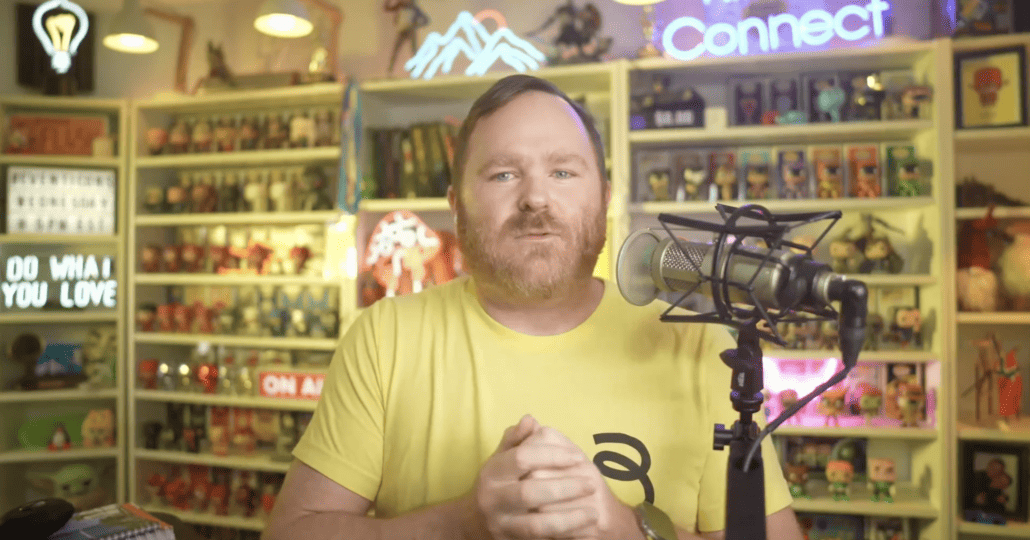 What will be the top event tech trends in 2024? Think data analytics, virtual year-round communities and, of course A.I.
What will be the top event tech trends in 2024? Think data analytics, virtual year-round communities and, of course A.I.
Event technology is ever evolving, but one thing you can be sure of is that it will play an increasing role in event planning in the coming year. But what specifically will be red-hot in 2024? A panel of experts tackled that topic — and much more — during a recent webinar hosted by event software provider Bizzabo and moderated by the company’s Head of Klik Will Curran (pictured above). Here’s just some of what they had to say.
2024 Event Tech Trend 1: Using data analytics to drive better event outcomes and more attendee engagement. Smart wearables, attendee tracking and other emerging event technology are making it easier than ever to collect and harvest data. “There is so much data available to us — it’s a matter of diving in. It’s about understanding our audiences and our target markets,” said Nicola Kastner, Founder, The Event Strategist. The problem is finding data, she added, saying that there are more than 150 data points you can collect around events. “That’s a lot of data. We have more data than we know what to do with.”
The key, she said, is to start by understanding your strategy, including what you’re trying to achieve and who your key target audiences are. “Once you understand those, you can build the right experiences.” One technology that is really coming into its own is wearables, she said. “I think wearables are a game changer… You can use that data to help attendees make their own connections now, “It’s not so one-sided anymore, which is really exciting for us as an industry.”
2024 Event Tech Trend 2: A.I. isn’t going to replace you. It’s someone using A.I. who is going to replace you. Brandt Krueger, a 25-year technology and event professional who currently serves as Senior Production Manager at EideCom, said A.I. for event planning was not going to be something planners can ignore. “This is actually something you do need to pay attention to,” he said. That’s because A.I. is a tool that will make planners more efficient. “While it’s not going to come take your job, it is definitely something you can use to help get things going.”
He believes the biggest application for event A.I. will be on the creative side. “What A.I. does best is help you get over the blank page…and get the creative juices flowing” — and save lots of time coming up with new designs using old tools like CAD. Krueger said he’s been punching keywords like “geometric shapes,” “lights” and “ballrooms,” as well as terms specific to the event itself, into generative A.I. “A lot of generative A.I. is a little weird. There will be weird facial features, there will be hands with six fingers, things like that, but it’s enough to get you over the blank page.” He showed pictures of photo-realistic A.I.-generated designs for a rooftop event that included live-looking plants, then layered in some steampunk elements when prompted. What would have taken hours to design now, at least in rough form, can happen in minutes using good prompt engineering.
He added that you have to be careful not to rely on it totally — “People are getting in trouble for that, like the lawyer who was in the news as being busted for having links to cases that don’t exist. We had an event that got canceled because they got busted for having fake people on their panels. Many of the women on those panels didn’t actually exist. They had made them up so the panels wouldn’t look like manels.”
He added, “Our hope, obviously, is to try to help you to not do that.”
A.I. also can be useful to summarize a lengthy document and come up with conclusions, Krueger said. For example, he recently fed a complex RFP into a Chat GPT-type service, asked the A.I. to summarize the document and provide what it thought the client’s top three questions would be. “It nailed it,” he said. “The top three questions they asked in the sales presentation were the three questions Chat GPT came up with.” He added that, while it’s not going to replace having human eyes reviewing and fact checking the results, “It’s definitely a way to start overcoming a lot of hurdles.”
One A.I. tech to be on the lookout for, he said, is a type of mini-Chat GPT where you can feed in a very specific dataset and have it spit back out the answers to specific questions based on that dataset. “That’s what I’m really excited about,” he said.
2024 Event Tech Trend 3: Engaging a year-round online community. Event planners have for years now been trying to find ways to continue the engagement that happens at in-person events throughout the year in online communities, to varying levels of success. It’s difficult, said Christine Renaud, CEO and Cofounder of Braindate by e180, because you have their full attention and engagement on site, but when they return home, they’re sharing that time and attention with family, and work, and everything else that’s going on in their lives.
“What can you provide that no one else can?” she said planners should ask themselves. “Obviously, that’s your expertise and thought leadership, but it’s also the people. How can you create a space where people can connect meaningfully around topics that are relevant to them just as they go through challenges in their daily lives. At Braindate, it’s all about learning from each other and helping each other on a daily basis.”
Kastner added, “I think we get too focused on our event. It’s a great way to build community in that moment in time. But community starts before and continues after. You have to think about the entire customer journey and relationship with the community” and find ways to add value across each of the channels.
“If we try and just create community at our events, and then try to recreate it as a standalone silo — with everything else that’s coming in, it’s not going to work. “We have to think holistically across every marketing channel and use each of them effectively to continue to build that community.”
Lauren Olerich, Senior Director of Events at Gainsight, said her team uses that concept to extend the reach of its flagship conference, Pulse. Gainsight uses its online community to introduce topics and encourages people to share their biggest nuggets of learning in the online community as well as on the event app, and also posts about particular session topics and things that happen before, during and after the event. But they also have Pulse offshoots for its small-scale networking events, called Pulse Local, and Pulse Check for its virtual event. For its mid-size in-person events in key regions, they have the Pulse Local community.
“Think about different ways that you can bring that through the calendar year and differentiate how you deliver your single event in other formats,” she said.
And don’t be afraid to use the communities participants already carry around in their pockets, such as WhatsApp groups, added Adam Parry, Cofounder and Editor, Event Industry News and Event Sustainability Live. “Something we probably don’t look too much are those technologies that are already in our pockets.”
Kastner agreed. Citing a Ted Talks conference she attended, she said a lesson she came away with was that “community is actually doesn’t need to be driven by the event organizer — community can be driven by the attendees themselves” using groups attendees self-build on tech such as WhatsApp.
View the entire webinar, now available on demand on Bizzabo’s website.
You May Also Be Interested In…
What’s in Store for 2024 Events?
Disruption and Transformation: What Else Should We Expect?
MPI Launches New Event Planning AI Certificate Program










